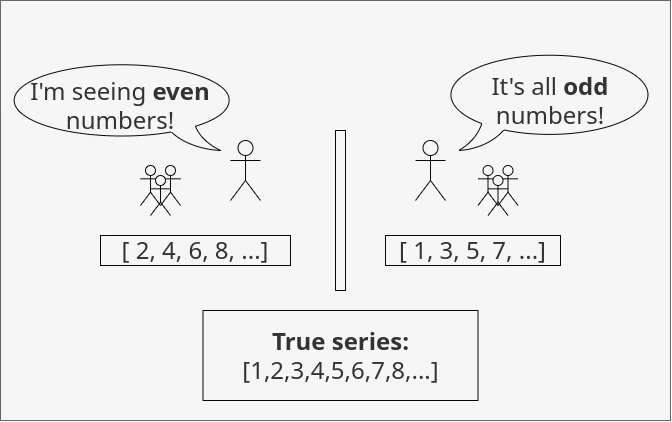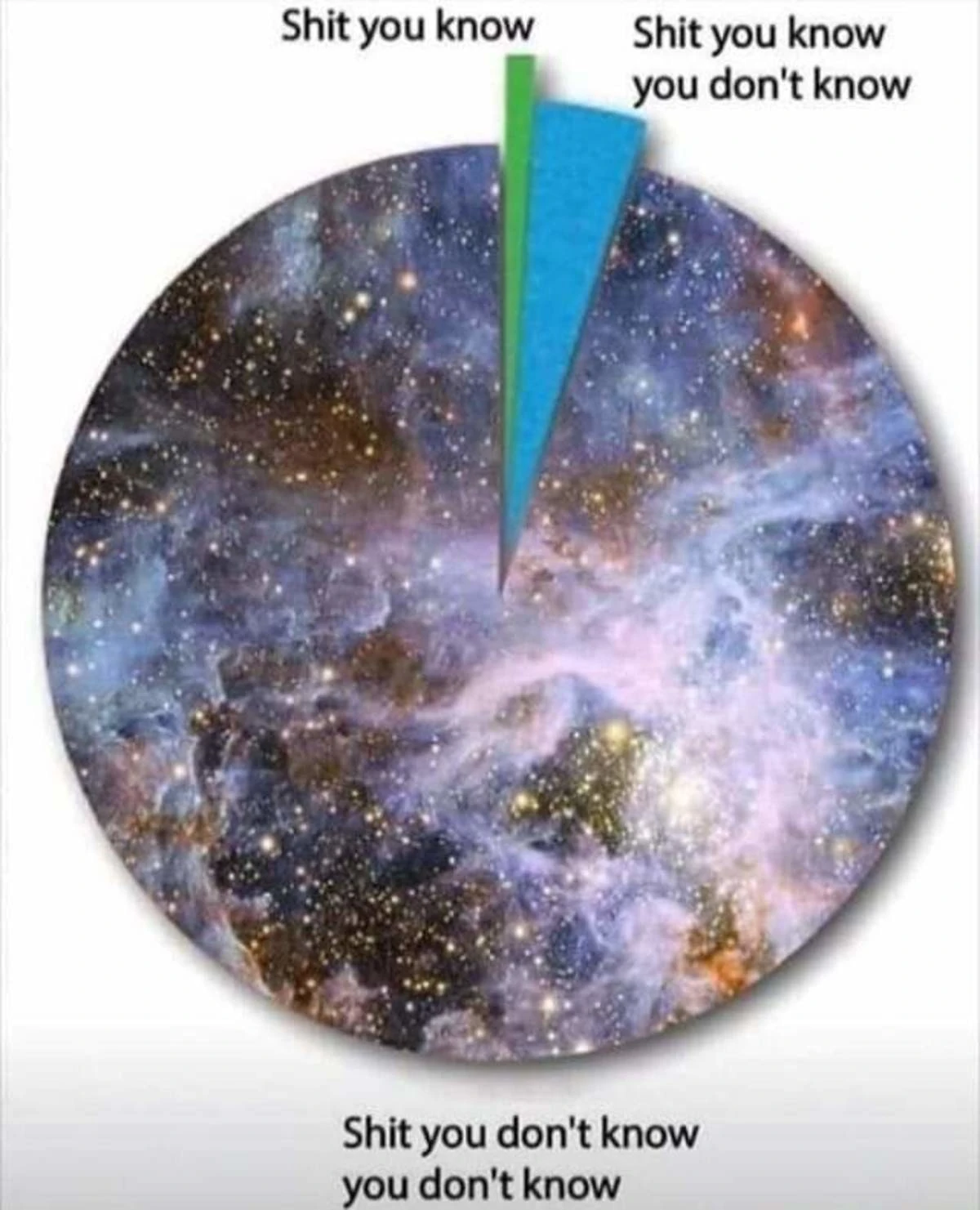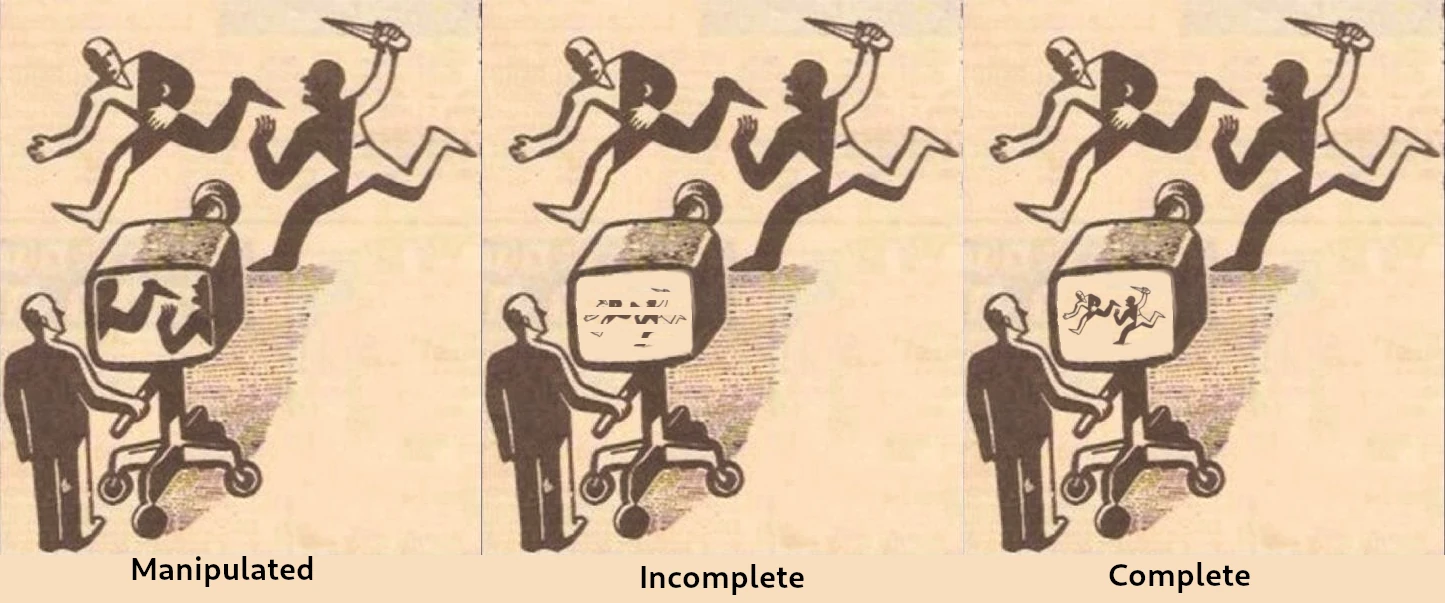Conceptualizing Information Control
By Gabriel
Published: Apr 23 2023
Operation: Beehive
Censorship
Operation: Chorus
Social Media
Technocracy
Cognitive Warfare
Remoralization
Voiceover
Knowledge is power. Control over knowledge is immense power. This power isn’t merely used to advance sciences and create new technologies, instead it’s often used to take control of other people. Almost everyone these days seems to believe they’re surrounded by brainwashed masses. What if there really is something to that? Who, or what, is actually doing the brainwashing?
It is a mistake to assume that someone who is acting differently than you is always making those decisions from incorrect information. There are often times where different people will have wildly varying interpretations of the same information. Now, instead of using the same information, see how they react to subsets of the same information.
This doesn’t mean that everyone is always right, but rather that they can often be talking about different aspects of the same problem. This has been a substantial driver of the Culture Wars because different messaging is naturally going to resonate with different subsets of the population. To make things worse, problems and solutions are framed in terms of “What nails can we hit with this hammer?” before considering other tools.

This is what has made language a critical component in political competition. If we do not share goals, it is to my advantage that I ensure that you use my framing to understand the world around you. Words themselves become skirmishes over the broad ideas they can represent. Splitting into dialects, different factions sound increasingly incomprehensible to each other. Cooperation becomes challenging, compromise becomes impossible. Even worse, people are no longer able to negotiate boundaries. This all-but-ensures future conflict.
Motivated reasoning
As this process advances, and people start to perceive that they are in some kind of existential competition, Culture Wars escalate. Suddenly, groups are less interested in finding workable common-ground, but instead every action is part of a greater conquest. Groups are now no longer devoted to cooperating in wider society, but instead fracturing out territory to secure their interests.
There is a fair amount of evidence, that much of the present-day divisions have been manufactured since the 2008 bail-outs and Occupy Wall St protests. I’m sympathetic to this interpretation, but it’s important not to lose sight that these manufactured divisions have real, material consequences.
Hurt people hurt people
These consequences have, and if not addressed, will continue to escalate tensions. The biggest challenge is that people are not always likely to state their frustrations in the most constructive manner. Tragically, many will often aggressively take out those frustrations on those they can, rather than the actual causes of that frustration.
How many wounds have been caused by the Covid Crisis? How many real avenues have people had to even have their grievances acknowledged? Different people will have all kinds of unique and complicated scars from different challenges. It is no small task to merely bring clarity and understanding to what has happened, it’s an even greater one to conceptualize the long arc of it all.
What does this all have to do with information control?
Leveraging people’s unique perspective towards specific ends is how targeted advertising works. The technocracy has had the tools and understanding of how to manipulate large groups of people, each one at a time, for well over a decade, if not significantly longer. Many rush to point to smartphones as the culprit. In fact, their rise in prominence is very coincident with the rise of many of the Culture Wars. I’ll present a different interpretation: It’s not the smartphone, but what was in it.
There is nothing inherently mind-killing about a small, portable computer that uses a touch-screen interface. What truly forged the massive mind control apparatus was the things that came with it:
- Real-time location tracking
- 24/7 audio and video surveillance capabilities
- Corporate Social Media as Digital information Control Systems
Information Control Systems have been the cause of not only the Culture Wars, but many more problems as well. The smartphone era was what made these Information Control Systems go digital, but it was not the origin of information control.
Surveillance is rarely merely about curiosity, rather it’s about gathering information to leverage control over situations. Massive dragnet surveillance of the population is one of the greatest acts of Information Asymmetry in all of human history.
Information Asymmetry
I know you are, but what am I?
Spy craft of all kinds is highly reliant on information asymmetry. Being able to see even only marginally clearer through the fog of war is a massive advantage.
There are three ways to gain and maintain your advantage :
- Become faster or more efficient at uncovering valuable information
- Sabotage other efforts by undermining them directly
- Selectively manipulate or destroy information not to your advantage
This is where surveillance, censorship, propaganda, and all kinds of devious activities come into play. By being able to monitor you, while keeping things secret from you, powerful entities are able to maintain an immense advantage over you.
- By learning your emotional limits, it’s possible to learn how to manipulate you.
- By learning your habits, it’s possible to plan around them.
- By understanding who you are, it’s possible to target you specifically.
It’s impossible to comprehend the scope of what information about you is available for mechanized manipulation. On the other hand, it’s vastly simpler for someone with control of that data to use it for nefarious ends. This vastly enhances psychological manipulation efforts and puts each person at the mercy of forces they can’t fully understand.
It is the height of hubris to take your understanding of publicly available information to be the best understanding anyone can have. It is a guarantee that there are groups and lines of communication that you’re not aware of that have been more successful at gleaning a clear picture.

This is why the stereotype of “the lone conspiracy theorist” is such delicious fodder for conspirators. There may simply not be enough information available to truly present a coherent case, even when there is one. With full understanding of your conspiracy, you can selectively reveal information to undermine even the best possible explanation. Even worse, it possible to discredit true accusations with slander and deflection.
If an entity has a clear understanding of a situation or set of information that knowledge can be used to selectively manipulate disclosure.This is different than a merely incomplete picture that just happens to be lacking information. Without knowing the entire picture it can be very difficult to distinguish manipulated from incomplete information.
This is why limited hangouts are such a serious concern. While it’s possible that companies and institutions may be interested in true transparency, unless they’re willing to provide all the information as they have it, it’s still at best an incomplete picture. They may be obligated to omit information for legal reasons, or deliberately omit references to certain events to fundamentally alter people’s perception of the disclosure.

Many times, the best that people have is an incomplete picture. People can quickly fall into the trap of grasping the first seemingly-coherent explanation that fits the data they have, without realizing that they may be missing all kinds of crucial information. While this may sound like the worst case scenario, it is far better than falling prey to a manipulated understanding presented by an adversary.
Digital Information Control Systems
I routinely call any centralized information sharing platform an Information Control System. This is precisely because of the asymmetric information advantage given to those who run and operate the system over the people who participate in it. Rudimentary tools like “Trending” lists are such a minor fraction at what operators of these systems have at their disposal.
For example, one could learn all kinds of things about you if they merely had access to your credit card’s purchase history. Just like if I read through every post you’ve ever made online. Any tool that isn’t explicitly avoiding collecting data, is inherently vulnerable to divulging such information.
Surveillance is only half the story, manipulation is the other side of the coin. In many cases outright censorship is too crude. It’s well observed that the majority of people like to rely on whatever main feed the system provides for them, and will make hardly any attempt to deviate from it. This means that the main feed on any application is prime real estate for those who want to buy and sell your time and attention.
Outside of mere commodification, anyone who has a monopoly over a large number of people’s attention in this way has the capability to do great harm to others. This is the true danger of information control systems, this is what makes civilian targets ‘fair game’ in information war. You have likely heard that your mind is a battlefield, but what is the war over?
The prize for information control is nothing short than all-out dominance. Maintaining information control is an inherently aggressive stance. The people most interested in identifying where everyone spends all their attention, are the most likely to have nefarious motives for doing so.
So you have three major choices:
-
Opt-out, and ignore the information landscape entirely.
To the degree that you can, as there are always choices to be made.
-
Choose a side, and face the consequences.
By joining the ranks of a cultural titan you are at the mercy of it, and your newfound enemies.
-
Democratize the information landscape as much as possible.
Instead, work to mitigate the ability of those to control others.
Predictive Programming
I reject the common definition of predictive programming and present you with a different one:
Using indoctrination to get the public to accept and act out an impossible concept.
That’s it. No complicated whinging about karmic consequences or secret plans. The world is a stage, and predictive programming is all about teaching the public what role they need to play. What’s powerful about these impossible concepts, is that like any scam, there’s always more. Always another try, another attempt at converting your hard-earned resources and attention into their profit.
Transitioning to renewables
Fortunes have been made off of the delusion that it’s possible to transition the majority of human energy consumption to wind and solar energy. By leveraging the public’s ignorance of the true energy cost in running society, investors and consumers alike can be freely fleeced of resources in the name of making the impossible happen.
It’s akin to hooking up two motors to a battery, and demonstrating that your perpetual motion machine is a breakthrough that will revolutionize the energy industry. Sleek 3D rendered windmills and solar panels on bright grassy landscapes leave out the awkward details that get in the way of real-world application.
Pandemics
Long before the Covid Crisis people were presented with many examples of a hyper-lethal and hyper-contagious virus that would necessitate extreme measures. People grew to accept the idea that an indeterminable emergency would require all kinds of extraordinary measures without any real rational explanation.
I don’t believe it is possible for any contagion to meet these three conditions:
- It must be sufficiently contagious, otherwise it wouldn’t be a problem
- It must be sufficiently severe and untreatable, otherwise it would be dealt with easily
- It must be successfully contained by measures taken during the Covid Crisis, otherwise there would be no point in trying in the first place.
A virus that meets two of those criteria would still a serious problem, but would not require the suspension of constitutional rights and massive wealth transfer orchestrated during the Covid Crisis.
AI Sentience
Currently, many people fall victim to many mass media depictions of machine minds capable of sentience. This is vastly detached from the current or even rationally projected state of machine learning. I’ll be the first to say that large AI models are very powerful and sophisticated tools, but they are not as magical as the hype would imply.
Machine learning models are essentially massive tables of numbers. Training the model involves modifying the numbers to fit the desired outcome. This results in a very useful table of numbers, but not a sentient one. Tragically, people are already anthropomorphizing these tools at the expense of real human interaction. I promise you, while large language models are quite interesting, they do not grow fond of you or even have a stake in your life.
Fearing them is also the opposite mistake, very often it’s not the tools themselves that are evil, but rather the ends that people aim to use them for. It is critical that you invest in yourself as a human being, rather than live in terror that machine minds are out to destroy humanity. The terrible truth is that human beings are all too capable of that themselves, and they should be held responsible regardless of the methods they employ.
Overcoming Information Control
Discretion
Privacy and Security are important. It’s more important than ever to use tools that aren’t proactively testifying against you. Software and hardware freedom are vitally important concepts these days that we should all do our part to promote.
Opposing the use of mass surveillance by the state and corporations is also of utmost importance. Privacy and anonymity need to be normalized, and the consequences of abusing people’s private information need to become more severe.
Humility
Don’t fool yourself into thinking you can or will know everything. Understand that you and everyone around you is only human and there are limits to your knowledge. Idolizing a specific person as the expert on everything, even on a singular topic, is often a surefire way to be misled. With a healthy amount of distrust, you can build an understanding that isn’t reliant on completely outsourcing your cognition to others. It’s important to be courageous enough to question, but humble enough to question yourself too.
Persistence
Personal memory units were banned six years before the crash, after someone found out that a few rogue Interplanetary Holy Tech officers were routinely editing consciousness data blocks in the cloud, modifying public opinion against IHT guidelines. There was an upheaval, media pundits had a field day, and the court hearing was transmitted to every citizen’s brain. In the end, the IHT officers pleaded guilty and were sent to the Genetic Recycle Lab. Shortly after, the AI Head of the IHT gave an address in which they talked about the need to tighten memory data security. Evidently, the best algorithms have been consulted with, and they concluded that personal units had to be turned in. I considered doing as I was told—but something inside me rebelled. Perhaps it was the fact that I have always felt like I was different, or maybe it was an encoded message from my grandfather, a famous artist and dissident who disappeared into the Genetic Recycle Lab a hundred and fifty years ago. I chose to follow my gut—and wiggled my way out of compliance.
Deprecating Free Will: A Future We Don’t Have to Accept
By Tessa Lena
You need to save information.
One of the primary goals of information control is suppressing information that can be used to support dissenting narratives. Taking notes, or preserving information, is a very simple and effective way to prevent that outcome. The more people can do do preserve information the further along we can be to truly leveling the playing field.
By extending your own and the public’s memory, you can safeguard yourself and others from mass manipulation. Nothing is new under the sun and old scams resurface with new sleek branding. Being able to point out the connections can make a critical difference at important times.
Cooperate
Do what you can to meaningfully communicate with others. Take the time to be patient with those with different perspectives. Even if you don’t end up agreeing, there is very often lots of useful information to glean. Where possible, do your best to connect with others to understand them on a deeper level. Working with others allows you to accomplish more than you could on your own. By cooperating you can uncover things that may be impossible alone.
Not only do you need to do this for yourself, but you should want to pass down critical information to future generations, rather than just mere material wealth. Communicating across generations is one of the most important ways to ensure that people don’t keep falling into the same all-too-familiar traps. A straight-forward way to do this is to publish your own information and attempt to make it as resilient as possible.
Sharing is caring!
Please send this post to anyone you think might be interested.
If you haven't already, don't forget to bookmark this site!
You can always subscribe with the RSS feed or get posts sent to your inbox via Substack.
